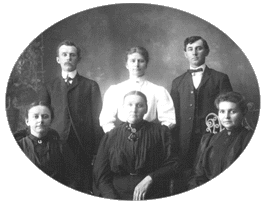
Genesis 12:1-4, 7, 9-10 (NRSV)
Now the Lord said to Abram, “Go from your country and your kindred and your father’s house to the land that I will show you. I will make of you a great nation, and I will bless you, and make your name great, so that you will be a blessing. I will bless those who bless you, and the one who curses you I will curse; and in you all the families of the earth shall be blessed.”
So Abram went, as the Lord had told him; and Lot went with him. ... Then the Lord appeared to Abram, and said, “To your offspring I will give this land.” So he built there an altar to the Lord, who had appeared to him. ... And Abram journeyed on by stages toward the Negeb.
Now there was a famine in the land. So Abram went down to Egypt to reside there as an alien, for the famine was severe in the land.
Like Abram, Louise and Bertha and Elizabeth (Lizzie) and Jacob and Barbara (or Bettie, as the family knew her) and Henry left their country, their kindred, their father’s house, and journeyed to a new land, a land for them and for their offspring. They must have felt as alone as Abram must have felt, going to a strange land among people they did not know who spoke a language they did not know.
Life was not easy in the new land. The Zeisset immigrants had to pay off their passage, often working under harsh conditions. Abram experienced famine. Among the Zeisset immigrants, some‚€“at least Louise and Henry‚€“knew hunger. When the immigrants were established and on their own, they still knew the hard pioneer life of people living in recently settled territory.
Yet God promised that God would bless Abram and that Abram would be a blessing. Kathleen Norris in her book Amazing Grace: A Vocabulary of Faith, says that the word “bless” has its origins in a word that means blood. She notes that Bible stories often begin with a genealogy, a reminder that we have an unbreakable bond with family, both our family of origin and our faith family. The word “blessing” also carries the meaning of gift—a gift that is received without anything we have done to earn or deserve the gift.
Louise and Bertha and Elizabeth and Jacob and Bettie and Henry gave us the gift of being part of their family, the gift of living in this land, the gift of faith, the gift of good memories.
Madeleine L’Engle in her book The Summer of the Great-Grandmother says, “It’s a good thing to have all the props pulled out from under us occasionally. It gives us some sense of what is rock under our feet and what is sand. It stops us from taking anything for granted.”
Having the props pulled out from under us is not something we choose, not something we want, not something that seems like a good thing when it happens. Louise and Bertha and Elizabeth and Jacob and Bettie and Henry could not imagine something good coming from being orphaned and then going out on their own to a strange place. And yet, in their life journeys, they quickly knew what was rock and what was sand. They built their lives on the rock of faith, of love, of being a blessing to others.
We remember them today, and we are grateful for the blessing they have been to us. May we also live in a way that takes nothing for granted, and that results in our being a blessing to those who come after us.
Carolyn Zeisset